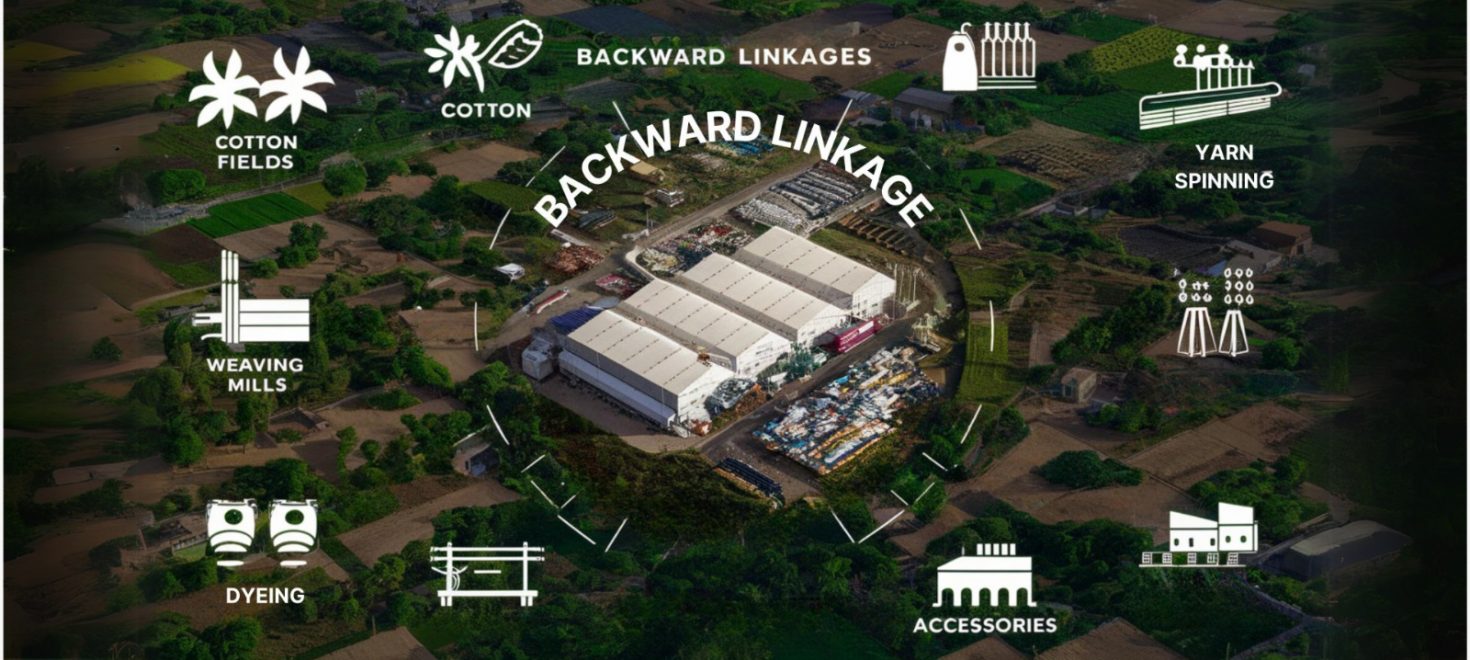Introduction
Bangladesh’s garment manufacturing industry stands as a true economic powerhouse. It’s the second-largest apparel exporter globally, boasting a staggering $84 billion in exports for 2023 (BTMA, 2024). This remarkable achievement can be attributed to a combination of factors, but one often-overlooked element is the crucial role of backward linkages.
Imagine the garment industry as a chain – strong and only as effective as its weakest link. Backward linkages represent the upstream portion of this chain, encompassing the network of suppliers that provide raw materials like yarn, fabric, zippers, buttons, and more (Textile Learner, n.d.).
Studies have repeatedly emphasized the critical role backward linkages play in the Bangladeshi garment industry’s success (Mia & Hasan, 2016; Razia & Sharmin, 2019). Here’s how a strong backward linkage system empowers the industry:
- Cost Savings and Reduced Dependence: Currently, Bangladesh relies on imports for a significant portion (around 60-70%) of its raw materials (Advance Textile, 2023). A well-developed domestic supplier base can significantly reduce this dependence, leading to lower overall production costs.
- Faster Turnarounds and Enhanced Competitiveness: Domestic sourcing allows for faster and more predictable delivery of raw materials. This translates to quicker response times for international buyers’ orders, giving Bangladesh a significant edge in the fast-paced fashion industry (Dragonsourcing Asia Limited, 2019).
- Improved Quality Control and Innovation: Stronger collaboration with domestic suppliers fosters better communication and quality control throughout the supply chain (ResearchGate, 2016). This paves the way for joint efforts in innovation, allowing Bangladesh to move beyond basic garment production and explore more specialized and value-added products.
Challenges Faced by Bangladesh in Backward Linkage/Raw Material Procurement
The dependence on external suppliers exposes the Bangladeshi industry to vulnerabilities and undermines its long-term growth potential. Let’s dissect the key challenges hindering Bangladesh’s backward linkage ambitions:
- Lack of Infrastructure: A Broken Foundation
The very foundation of a robust backward linkage system – adequate infrastructure – is lacking in Bangladesh (World Bank, 2018). Limited access to industrial zones with essential utilities like water treatment plants and waste disposal facilities further discourages investment in domestic raw material production.
- Financial Constraints: A Struggle for Capital
Setting up a textile or yarn production unit requires significant capital investment in machinery, technology, and skilled labor. Many potential domestic suppliers, particularly small and medium-sized enterprises (SMEs), lack the financial resources to compete with established players. High-interest rates and cumbersome loan application processes make it difficult for SMEs to secure the capital needed to invest in modern equipment and technology.
- Technical Expertise Gap: A Missing Link in the Chain
The current state of Bangladesh’s backward linkage system suffers from a critical shortage of skilled workers with expertise in operating modern textile and yarn production machinery. This lack of technical know-how can lead to inefficiencies in production processes, translating into higher production costs and lower quality raw materials (Amin & Rahman, 2018). Bridging this skills gap requires a concerted effort from both government and industry leaders to develop comprehensive training programs that equip the workforce with the necessary technical knowledge and practical skills.
- Competition from Established Players: A Daunting Landscape
Bangladesh’s garment industry faces stiff competition from regional giants like China and India, who dominate the market for raw materials (Advance Textile, 2023). These established players have several advantages: well-developed infrastructure, economies of scale due to larger production volumes, and access to cutting-edge technology. This translates to lower production costs and higher efficiency, making it challenging for Bangladeshi domestic suppliers to compete on price and quality, especially in the initial stages of development.
- Policy and Regulatory Hurdles: A Maze of Obstacles
Inconsistent policies, bureaucratic red tape, and a lack of clear incentives for domestic raw material production can create uncertainty and discourage investment (RAPID, 2018). Streamlining the regulatory framework and providing tax breaks or other incentives specifically aimed at encouraging investment in the backward linkage sector could significantly improve the investment climate.
Impact of these challenges on the Garment Industry in Bangladesh
While the industry thrives on its low-cost production, its overreliance on imported raw materials (around 60-70%) creates a web of challenges that could strangle its future growth (Advance Textile, 2023). Let’s delve into the impacts of these challenges on Bangladesh’s garment industry.
- Erosion of Profit Margins:
Any increase in international prices for yarn or fabric can instantly eat into their profit margins, making it difficult to compete with rivals who have a more established domestic supply chain (Mia & Hasan, 2016). This price volatility can also lead to production delays and order cancellations, further impacting the industry’s stability.
- Vulnerability to Supply Chain Disruptions:
Geopolitical tensions, trade wars, or even natural disasters can disrupt the flow of imported raw materials, leading to production halts and lost revenue (RAPID, 2018). A strong backward linkage system would offer greater control over the supply chain, mitigating the impact of such external factors and ensuring a more resilient production process.
- Limited Innovation and Value Addition:
The reliance on imported raw materials restricts Bangladesh’s ability to move beyond basic garment production and venture into higher value-added products. Limited domestic production of specialized fabrics and technical textiles hinders innovation and restricts the industry’s potential to cater to niche markets with higher profit margins.
- Missed Opportunities for Job Creation:
A well-developed backward linkage system could create significant job opportunities throughout the entire textile value chain, from cotton farming to yarn production and fabric manufacturing (World Bank, 2018). However, the current system limits job creation to garment manufacturing itself, hindering the industry’s potential to contribute more significantly to Bangladesh’s overall economic growth and development.
- Environmental Concerns:
Developing a stronger domestic supply chain would reduce reliance on long-distance transportation, minimizing the industry’s environmental impact and creating a more sustainable production model.
Suggestions to Overcome Challenges Faced by Bangladesh in Backward Linking/Raw Material Procurement
Overdependence on imports weakens Bangladesh’s RMG industry’s resilience and limits its potential. Below are actionable suggestions to address these challenges:
Boosting Domestic Production:
- Targeted incentives: The government can provide financial and tax breaks to domestic yarn, fabric, and trims producers. This can incentivize investments in expanding production capacity and competing effectively.
- Skill development programs: Investing in programs to train a skilled workforce across all aspects of the textile value chain is crucial. This includes expertise in areas like yarn production, fabric weaving, knitting, dyeing, and quality control. Collaboration with universities and technical institutions can create a pipeline of skilled professionals.
Strengthening Supply Chain Management:
- Improved infrastructure: Investments in transportation networks, power grids, and storage facilities are essential. Efficient logistics will ensure timely movement of raw materials and finished goods, reducing lead times and costs.
- Technological adoption: Encouraging the adoption of modern technologies in yarn production, weaving, knitting, and dyeing can enhance efficiency and productivity. This can involve utilizing automation, digital inventory management systems, and quality control technologies.
Enhancing Quality and Standards:
- Establishing industry-wide quality standards: Developing and enforcing stricter quality control measures throughout the supply chain is essential. This can involve collaborating with international certification bodies and adopting best practices.
- Traceability and transparency: Implementing robust traceability systems can build trust with international buyers and ensure ethical sourcing of materials. This can involve tracking raw materials from source to finished product.
Addressing Financing Issues:
- Facilitating access to credit: Providing loan guarantees and establishing specialized financial institutions can make credit more accessible to domestic RMG suppliers. This will enable them to invest in essential equipment and working capital.
- Public-private partnerships: Collaboration between the government, banks, and industry stakeholders can create innovative financing models to support domestic suppliers. These models could involve blended finance with concessional loan terms or equity participation.
How Groyyo can be the key contributor to overcome these challenges
Groyyo Consulting, a leading expert in the apparel and textile industry, offers a comprehensive suite of services that can empower Bangladeshi manufacturers to overcome these challenges and build a more robust backward linkage system.
Understanding Groyyo Consulting’s Expertise
Groyyo Consulting positions itself as a catalyst for transformation in the apparel and textile industry, boasting a team of diverse professionals with deep industry knowledge. Our “Grow With Our Expert’s Strategic Solutions” tagline emphasizes our commitment to providing practical and effective solutions to clients.
Addressing Challenges Through Tailored Services
Groyyo Consulting offers a range of services directly applicable to strengthening backward linkages in Bangladesh’s RMG industry:
- Supply Chain Optimization: Groyyo’s expertise can help RMG manufacturers map their current supply chains, identify inefficiencies related to raw material procurement, and develop strategies for sourcing domestically. This could involve identifying potential domestic suppliers, negotiating better deals, and optimizing logistics for efficient movement of raw materials.
- Technical Expertise and Skill Development: The lack of a skilled workforce in various aspects of the textile value chain hinders domestic production. Groyyo Consulting can bridge this gap by offering training programs or collaborating with institutions to develop skilled professionals in yarn production, weaving, knitting, dyeing, and quality control. This injects much-needed expertise into the domestic supply chain.
- Technology Integration: Groyyo’s focus on technological solutions can be instrumental in modernizing domestic yarn, fabric, and trims production. We can advise on implementing automation, digital inventory management systems, and quality control technologies, leading to increased efficiency and product quality. This will allow domestic producers to compete more effectively with international players.
- Project Management and Implementation: Establishing a robust domestic supply chain requires careful planning and execution. Groyyo Consulting’s project management expertise can be invaluable in setting up new production facilities, managing logistics, and ensuring smooth implementation of new technologies and processes.
Conclusion
By leveraging Groyyo Consulting’s expertise in supply chain optimization, technical skill development, technology integration, project management, and strategic guidance, Bangladeshi RMG manufacturers can overcome the challenges of weak backward linkages. A stronger domestic supply chain will not only enhance the industry’s resilience but also unlock its full potential for growth, innovation, and a more sustainable future. Groyyo Consulting stands as a valuable partner in this transformation journey.
divyamohan@groyyo.com
abhishekyugal@groyyo.com



Leave a Comment